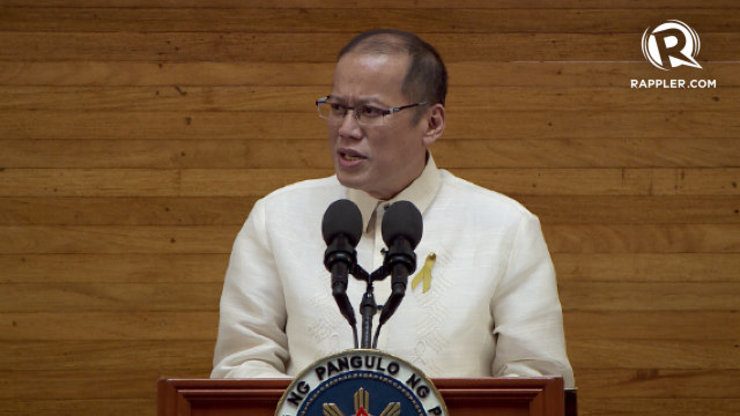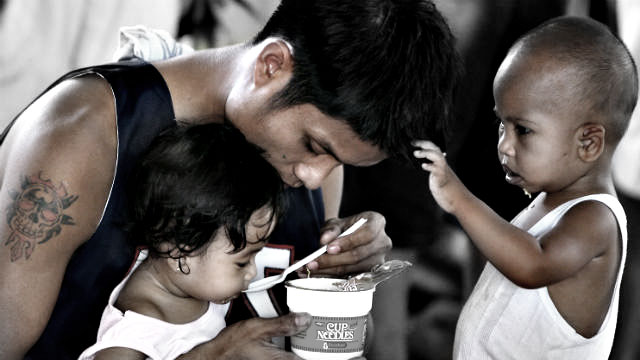SUMMARY
This is AI generated summarization, which may have errors. For context, always refer to the full article.
 The President spoke of his administration’s accomplishments and future plans during his 5th SONA. He forgot, however, to discuss hunger – a daily battle fought and lost by many Filipinos.
The President spoke of his administration’s accomplishments and future plans during his 5th SONA. He forgot, however, to discuss hunger – a daily battle fought and lost by many Filipinos.
Aquino’s SONA coincided with the country’s National Nutrition Month, and yet “nutrition” was never mentioned, too.
His speech came just a month after the 8th National Nutrition Survey (NNS) was released by the Food and Nutrition Research Institute of the Department of the Science and Technology (FNRI-DOST).
NNS revealed that not much has changed in the nutritional status of Filipino children in the past 5 years. Many children still struggle with wasting or being too thin for one’s height, and stunting or being too short for one’s age.
Beyond their bony frames is an even bigger problem – delayed mental development, which can directly impact on the country’s economic performance in the long run.
Two days after his speech, the Social Weather Stations (SWS) revealed that 16.3% of Filipino families or around 3.6 million households experienced hunger in the past 3 months. This is slightly lower than the first quarter results; however, these numbers still cannot be dismissed.
Mindanao had the highest hunger incidence at 21.3%, SWS reported. FNRI-DOST also found that the Zamboanga Peninsula and ARMM had the highest stunting prevalence among children.
The National Nutrition Council (NNC) recognized the need to improve the country’s response to its growing nutrition problem, especially during times of disasters, and yet the President chose to remain mum about it.
Is it embarrassing to talk about hunger? Is it shameful to admit that the Philippines is home to some of the world’s unhealthiest infants and children? Does ignorance solve problems?
Aquino spent a lot of time talking about gains under his administration, and of course, his parents, while he criticized his critics.
The President did not talk about hunger during his SONA; however, health workers, advocates, non-governmental organizations (NGOs), and families are not keeping silent.
“The truth is that I am not the one these people oppose, but the entire Filipino people who are now reaping the benefits of the straight path,” Aquino told his critics.
But I am not opposing the Filipino people; I am opposing both your and your administration’s inaction.
I do not know why are you being over-sensitive to criticism. Not all criticism is baseless, and in the case of hunger, there are statistics to prove how dire the situation is; there are studies stressing how poor nutrition is linked to other problems; and lastly, there are families whose voices you do not seem to hear, they are asking for support – not a one-time kind of support that can feed them for a week or two, but something more sustainable like land, housing, healthcare, education, and jobs.
Words, actions

Aquino said he wants to uplift the agriculture sector, which is commendable. Here’s hoping that his words translate into action.
“We are ensuring that rice farming remains a viable and attractive livelihood. After all, we know that our farmers are advancing in age, which is why it will help our pursuit of food security to encourage the youth to enter this kind of work,” Aquino said.
I was patiently waiting for him to mention “food security,” and was really glad when he did, even though this part of his speech ate up only a couple of seconds from his 90-minute monologue.
He spoke of support provided to farmers such as irrigation, farm-to-market roads (FMRs), land distribution, training, and equipment. Again, this is commendable. But there is a need to keep an eye on how these projects are progressing, or if they are making any progress at all.
Data from the Department of Agriculture show that a lot is yet to be done in the construction and improvement of rural roads and irrigation systems which are crucial for ensuring food security and livelihood.
Meanwhile, the ruckus surrounding the seemingly never-ending process of land distribution continues. Nobody really talks about it unless a rally happens, a farmer is assaulted, or crops and huts are burnt.
I have met several farmers, but only few own lands – such is the reality in the Philippines. Isn’t it ironic that the farmers and fishers who feed us cannot afford to feed themselves?
And whatever happened to aiming for rice self-sufficiency? If agricultural workers are well-supported, then the country won’t have to import rice. This way, the Filipino youth, as Aquino said, can be encouraged to work in agriculture. It won’t be easy, but it would become plausible.

Simple
Aquino spoke proudly of how his administration purchased new guns; how I wish that someday he can also boast of new hospitals, food and agricultural technologies, schools, and better compensation for health professionals, teachers, agricultural workers, and barangay health workers.
What are we demanding? For the government to help its people practice their right to food. A good start would be to highlight the importance of nutrition – local government units (LGUs) should properly invest in health and nutrition programs, policies, and facilities.
Concerned government agencies – DOH, DSWD, DAR, DA, NAPC, NHA, DOST – must then step up and strive to create better programs focusing not only on response, but also on prevention.
Well-informed families are less likely to suffer from malnutrition and related diseases, but programs must not end with information dissemination, they must have concrete actions.
Government may want to listen to the creative solutions proposed by NGOs and citizens themselves:
- Allot a certain amount to provide clean water, modern stoves, toilets for poor communities
- LGUs can support local farmers by purchasing their goods and using them to sustain year-long school feeding programs
- Establish community-based food banks, milk banks, kitchens, vegetable gardens
- Better integrate health and nutrition lessons in school curricula
- Create stronger laws penalizing parents who neglect their children
- Create laws requiring the private sector to help provide sustainable employment not only for those who graduated from college, but also for those who did not
- Create laws requiring big restaurants to donate a certain amount of their earnings or clean leftovers to the needy. Establish a department in charge of this program.
- Establish more centers which aim to rehabilitate street children, with a goal of not having these children return to the streets. Allot an appropriate budget for its operations.
Topping the list of the Millennium Development Goals is to reduce hunger and poverty – something the Philippines will most likely fail at. With only a year left before the MDGs’ deadline, it’s strange and dismaying not to hear anything from the President.
But it’s okay, if Aquino doesn’t want to talk about hunger, then that means we should. Maybe then, he’ll start listening to his “bosses.” – Rappler.com
Add a comment
How does this make you feel?
There are no comments yet. Add your comment to start the conversation.